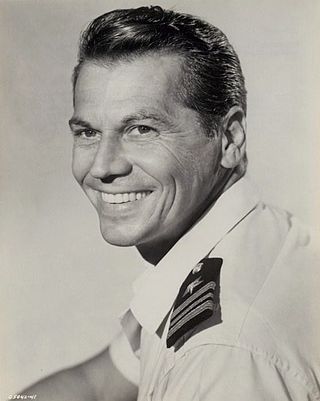
Roderick Andrew Anthony Jude McDowall was a British and American actor, whose career spanned over 270 screen and stage roles across over 60 years. Born in London, he began his acting career as a child in his native England, before moving to the United States at the outbreak of World War II. He achieved prominence for his starring roles in How Green Was My Valley (1941), My Friend Flicka (1943), and Lassie Come Home (1943). Unlike many of his contemporaries, McDowall managed to transition his child stardom into adulthood, and appeared on Broadway as well as in films, winning a Tony Award for his performance in Jean Anouilh's The Fighting Cock. For portraying Octavian in the historical epic Cleopatra (1963), he was nominated for a Golden Globe Award.

Ronald Egan Randell was an Australian actor. After beginning his acting career on the stage in 1937, he played Charles Kingsford Smith in the film Smithy (1946). He also had roles in Bulldog Drummond at Bay (1947), Kiss Me Kate (1953), I Am a Camera (1955), Most Dangerous Man Alive (1961) and King of Kings (1961).
Sumner Locke Elliott was an Australian novelist and playwright.

Dame Doratea Alice Lucy Walkden Fitton, was an Australian pioneering theatre entrepreneur, actress of stage and film and theatrical director and producer who established with 19 other actors The Independent Theatre Ltd. in North Sydney, New South Wales in 1930, which operated for forty-seven years.
Rusty Bugles was a controversial Australian play written by Sumner Locke Elliott in 1948. It toured extensively throughout Australia between 1948–1949 and was threatened with closure by the New South Wales Chief Secretary's Office for obscenity.
Independent Theatre, formerly known as The Independent Theatre Ltd., was an Australian dramatic society founded in 1930 by Dame Doris Fitton in Sydney, Australia. It is also the name given to the building it occupied from 1939, now owned by Wenona School, in North Sydney, cited as Sydney's oldest live theatre venue.
Lloyd Berrell was a New Zealand actor who played Reuben "Roo" Webber in the original Sydney production of Summer of the Seventeenth Doll. He worked extensively in Australian radio and theatre, appearing in a large portion of the films being shot locally at that time. He also starred in the original stage production of Sumner Locke Elliott's Rusty Bugles as well as numerous productions for the Mercury Theatre.
Interval is a 1939 play by Sumner Locke Elliott. It was popular and was performed throughout Australia at a time when this was not common for local plays.
The Cow Jumped Over the Moon is a 1937 Australian stage play by Sumner Locke Elliott. It was the first stage play by Elliott who was only twenty years old when it debuted.

The Invisible Circus is a 1946 Australian stage play by Sumner Locke Elliott set in the world of commercial radio drama, a field that Elliott knew well from many years writing for George Edwards. Elliott is represented in two characters, the idealistic Brad and the more jaded Mark.
Goodbye to the Music is a 1942 Australian stage play by Sumner Locke Elliott.
Your Obedient Servant is a play by Sumner Locke Elliott. It was first performed at Sydney's Independent Theatre directed by Doris Fitton. The play was an allegory for the fascist occupation of Europe.
Wicked is the Vine is a 1947 radio play by Sumner Locke Elliott that was later adapted for American television.
Venus Observed is a play in blank verse by the English dramatist and poet Christopher Fry. The play concerns a Duke who decides to remarry for a third time. He gets his son Edgar to pick the bride. The Duke likes Perpetua but Edgar wants her for himself.
Peter MacGregor Pagan was an Australian-American actor from Sydney best known for his role in The Overlanders (1946).

The King's Theatre was a theatre in Melbourne, Australia, located at 133 Russell Street between Bourke Street and Little Collins Street.
The Crater is a 1948 Australian radio play by Sumner Locke Elliot that was later adapted for American television.
The Playwrights' Advisory Board was an Australian organisation established in 1938 to assist the cause of Australian playwriting. It was established by Leslie Rees, Rex Rienits and Doris Fitton. Its functions included negotiating productions with theatres, acting as an intermediary in the nomination and collection of royalties, advising theatres and playwrights on scripts, and holding script competitions. Members of the board included names such as Dymphna Cusack and Sumner Locke Elliott.
Jezebel's Daughter is a 1941 Australian radio serial by Sumner Locke Elliott for the George Edwards Players. The serial was one of the most successful from Edwards.
Florence Ravenel also known as Florence Ray, was an American stage, radio and film actress, perhaps best known for her work on the radio series The Court of Missing Heirs, and on the TV sitcom The Farmer's Daughter.





